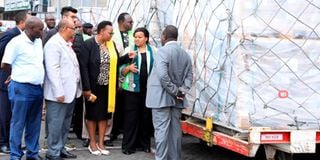Breaking News: At least 10 feared to have drowned in Makueni river
Into the land of the rising sun: Hope as Kenyans go to polls

IEBC commissioners led by Vice Chairperson Juliana Cherera lead political parties' representatives in receiving the presidential ballot pallets at JKIA on July 27, 2022.
What you need to know:
- To fashion a new collective destiny of hope, we must change our voting behaviour.
- We shouldn’t gamble with our future. Let’s vote wisely and may we meet on the other side of hope after the elections.
Kenya is a land of paradox and gaping extremes — a place of irony where tears of joy freely mix with tears of despair, awful tragedies punctuate wonderful experiences, murky slums border dazzling, tree-lined suburbs — confused juxtaposition that at times creates a jarring sense of schizophrenia, leaving one more than a little bewildered.
Writer Billy Kahora must have had this in mind when he aptly described Kenya as a “half-made place”, a country of “parallel universes, parallel economies, parallel lives, futures and realities”.
It’s like a house where one has just half-moved in or half-moved out. A place where most people are growing like trees on poor soil — their dreams snuffed out.
The Kenyan dream comes in many shapes and sizes — from a perfect holiday in the sun-drenched, powder-soft white sands of Mombasa while gazing at swaying coconut trees and a shimmering turquoise ocean with warm inviting blue waters, to looking with wonder at the spectacular peaks of Mount Kenya jutting into an evening sky; from owning a big house in a leafy suburb to listening to the hybrid hum of one’s own Range Rover.
But for most Kenyans, the dream of a good life is yet to become a reality.
This was what the Zimbabwean writer Dambudzo Marechera wrote about in his appropriately-titled novel, The House of Hunger: “We knew that before us lay another vast emptiness… Life stretched out like a series of hunger-scoured hovels stretching endlessly towards the horizon... Gut-rot, that was what one steadily became. And whatever insects of thought buzzed about inside the tin can of one’s head… the sun still climbed as swiftly as ever and darkness fell upon the land as quickly as in the years that had gone. The lives of small men are like spiders’ webs; they are studded with minute skeletons of greatness”.
"House of hunger"
This paragraph is an apt description of the masses of Kenyans in a figurative “House of Hunger” with many unrealised dreams and dashed hopes.
Life is indeed like a series of “hunger-scoured hovels”. There is physical hunger, of course, especially now with the rising cost of living.
However, in most Kenyans, there is a desire for the basic things they do not now possess — it could be the desire for food, shelter, clothing, or a decent education for their children.
There is something heart-breaking about poverty. Muhammed Kijuma’s poem, Song of the Poor Man, breaks it down distressingly: “The face of the poor man/ is haggard and furrowed/ with the hunger and thirst/ that are in his vitals…Poverty is no right thing/when it falls to a man’s lot/though he is noble-born/he has no success”.
He has no success and oftentimes, it’s not for lack of trying. One can wake up early, work hard and still not have a meal at the end of the day.
This is proof that Project Kenya is still a work in progress — to make the lives of many better by at least providing access to basic public services.
In matters of public health, for instance, Kenya should be declared a country of WhatsApp groups.
One can be in as many as ten or more WhatsApp groups and all of them could be one fundraising or another especially those related to medical bills.
This is a cry for a functioning public health system. In some cases, the hospitals have been built but, in most cases, they do not have the personnel or medicines required.
Unfortunately for Kenyans, during elections, they sometimes elect celebrity clowns who do not understand any of that.
They elect the people who steal the money meant for hospitals and convert that money to handouts, which they give to voters (the politicians probably keep most of the loot).
Most of the time, when voters say a political candidate is “good”, it sometimes means that he or she has given them handouts.
That’s not how to get leaders who will sort out our public health challenges or any of the other issues we are facing.
Paradox
The paradox is that most of the time, the Kenyan voter votes against his/her interest.
The visionary leader who may stock our hospitals and reduce our dependence on WhatsApp groups for fundraising may be that candidate without any handouts to give.
We vote in clowns and continue with our WhatsApp groups’ fundraisings even for basic services that should be provided freely by the government.
And that’s the shame of the Kenyan electorate.
As we elect the president and other political leaders on August 9, 2022, we should be wise in our choices.
We should elect a president who will tackle the challenges we are facing from rampant corruption in the public sector, the rising cost of living, the high national debt, lack of basic public services and other pressing issues preventing Kenyans from enjoying the Kenyan dream of prosperity.
To fashion a new collective destiny of hope, we must change our voting behaviour.
We shouldn’t gamble with our future. Let’s vote wisely and may we meet on the other side of hope after elections — in the metaphorical land of the rising sun.
johnmwazemba@gmailcom




